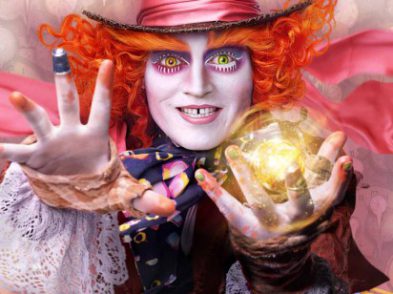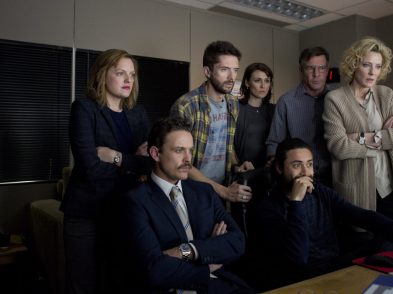For showtimes, see the events listing.
Odeon, Piazza Strozzi, 2
tel. +39 055 295051
SHAME
January 20, 21, 22, 25
‘This is a great act of filmmaking and acting. I don’t believe I would be able to see it twice’ (Roger Ebert). Michael Fassbender plays New Yorker Brandon Sullivan, whose compulsive lifestyle is disrupted by a visit from his sister. The brilliant young British director Steve McQueen’s uncompromising portrait of a sex addict is a worthy follow-up to his first movie, Hunger (also screening). ‘In a movie era remarkable for its reluctance to dramatize erotic intimacy, Shame merits praise for the dark energy of its sexual encounters’ (Time). ‘How can visual pleasure communicate existential misery? It is a real and interesting challenge, and if Shame falls short of meeting it, the seriousness of its effort is hard to deny’ (New York Times). ‘The biggest surprise in Shame is how distanced, passionless, and merely skin-deep the director’s attention is-how little he cares about the subject of his own movie’ (Entertainment Weekly).
PAGE ONE: INSIDE THE NEW YORK TIMES
January 23
Fly-on-the-wall documentary chronicling a year in the life of the newspaper, as print journalism is threatened by new media and changes in news production and delivery. ‘This efficiently assembled primer hardly counts as a revelatory dispatch from the old-vs.-new-media frontlines, but its ideas will engross anyone for whom the viability of traditional newsgathering remains a matter of pressing significance’ (Variety). ‘Page One is a vital, indispensable hell-raiser’ (Rolling Stone). ‘The movie’s main theme, no surprise, is the struggle of The Times to survive in the age of the Internet. But it does little to illuminate that struggle, preferring instead a constant parade of people telling the camera how dreadful it would be if The Times did not survive. True, of course, but boring to the point of irritation after five or six repetitions’ (New York Times[!]).
THE IRON LADY
January 27, 28, 29, February 1, 3, 4
‘One’s life must matter, Denis.’ Meryl Streep’s Margaret Thatcher will surely go down as one of her great performances, regardless of opinions on the politics of Britain’s first woman prime minister or the movie’s approach to her life on and off the world stage. ‘A biopic that values character over context’ (Hollywood Reporter). ‘Nothing is examined or analysed, little is illuminated in any revealing way, and because everything is seen from [Thatcher’s] distorted perspective there is no countervailing moral, political, historical force or argument… Breathtaking in its detail and nuance, its subtle gestures and inflections, this multifaceted jewel of a portrait is altogether grander than the commonplace setting of the film’ (The Observer).
TINKER TAILOR SOLDIER SPY
January 24, 26
John Le Carré’s classic Cold War spy thriller is given another outing with MI6 veteran George Smiley emerging from retirement to track down a Soviet mole. ‘Utterly absorbing, extremely smart and-considering this is a sad, shabby, drably grey-green orld of obsessives, misfits, misdirection, disillusionment, self-delusion and treachery-quite beautifully executed’ (Empire). ‘A skin-crawlingly atmospheric, uncompromisingly cerebral and austere account … a weightless, slo-mo nightmare taking place in what looks like an aquarium filled with poison gas instead of water: I found it more gripping and involving than any crash-bang action picture… What a treat this film is, and what an unexpected thrill’ (The Guardian).
HUNGER
January 20, 21
Turner Prize-winning artist Steve McQueen’s 2008 film debut recounts the protracted suicide by hunger strike of Irish Republican Army detainee Bobby Sands in the Maze Prison in 1981. ‘[McQueen’s] background in art has meant a fierce concentration on image, an unflinching attention to what things looked like, moment by moment. There is an avoidance of affect and a repudiation of the traditional liberal-lenient gestures of dialogue, dramatic consensus and narrative resolution. This is a powerful, provocative piece of work, which leaves a zero-degree burn on the retina’ (The Guardian). ‘The brutality in the film is pervasive and often stomach turningly graphic, but what is perhaps most unnerving is the tact, patience and care with which Mr. McQueen depicts its causes and effects’ (New York Times).
The British Institute
Lungarno Guicciardini 9
tel. 055/267781
The Talking Pictures series Dickens 200 commemorates the 200th anniversary of the birth of Charles Dickens with a selection of film adaptations of the famous novels.
OLIVER TWIST
January 25, 8pm
‘Please, sir, I want some more.’ This David Lean classic is the first of two of the many screen versions featured in this series, offering a traditional and very satisfying adaptation. ‘The film tellingly recreates the horrors of Victorian slum life (the attractive if artificial sets atmospherically lit and shot), and is particularly noteworthy for [Alec] Guinness’ striking Fagin’ (Time Out). ‘John Howard Davies is still perhaps the most memorable and affective Oliver yet seen on screen; the delicacy of his speech, and his muted, often awkward movements perfectly capture the sense of confinement that define the character. Robert Newton’s Bill Sikes is another highlight; the most relaxed performance Lean ever let slip through his directorial net.’ (BFI)
OLIVER!
February 1, 8pm
‘Consider yourself at home, consider yourself part of the family…’ Lionel Bart’s musical version offers a less dark and less grim take on the story. ‘”Oliver!” is a treasure of a movie. It is very nearly universal entertainment, one of those rare films like “The Wizard of Oz” that appeals in many ways to all sorts of people’ (Roger Ebert). ‘[Carol] Reed is craftsman enough to make an efficient family entertainment out of Lionel Bart’s musical, but not artist enough to put back any of Dickens’ teeth which Bart had so assiduously drawn’ (Time Out). Ron Moody’s (soft) Fagin may not be the best on film, but Mark Lester’s Oliver runs a close second to John Howard Davies’ for echt Dickensian schmaltz.







